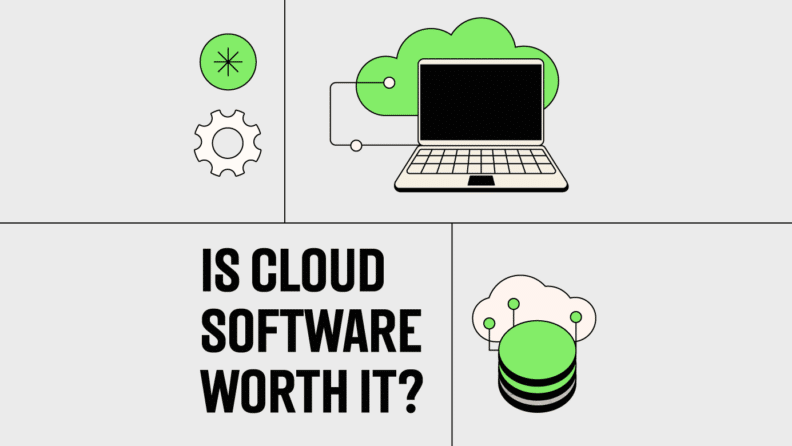Cloud Accounting: The Hero We Need: Cloud accounting software operates online, providing real-time updates and access from any device. It simplifies financial tracking, reporting, and transaction management compared to traditional, on-premise solutions.
CFOs Love Cloud Tech: A whopping 48% of CFOs are keen to invest in cloud technology within the next five years, recognizing its potential for effective financial management and stakeholder communication.
Automatic Backups: No More Data Blues: With cloud accounting software, you get automatic data backups, ensuring your financial information is secure and always available, reducing the risk of data loss.
Seamless Integration: Better, Faster, Stronger: Cloud accounting solutions often integrate with other business tools, enhancing efficiency and streamlining workflows across different departments within a business.
Real-Time Updates: Stay Ahead: The real-time updates provided by cloud accounting software help businesses stay on top of their financial data, making it easier to make informed decisions quickly and accurately.
The short answer? Yes, accounting software is worth it and, when it comes to types of accounting software, cloud is the best... for most businesses.
Here’s an analysis of everything cloud accounting to give you the insights you need for effective financial management and constructive stakeholder dialogues.
So, without further ado, let's jump in to find out why, exactly, 48% of CFOs are actively looking to invest in cloud technology over the next five years.
What is Cloud Accounting Software?
Cloud accounting software is a type of financial management tool that operates online, allowing users to access and manage their accounting data from any internet-connected device.
It offers real-time updates, automatic backups, and often integrates with other business tools. This makes it easier for businesses to track finances, generate reports, and manage transactions without relying on traditional, on-premise software.
Our Favorite Cloud Accounting Options
If you want to explore specific tools, these are the ones our team recommends you start with:
Key Features of Cloud Accounting Software
When choosing a cloud accounting software, there are some key features your solution should have to make it beneficial. This includes:
- Real Time Access: Users can access financial data and reports from anywhere with an internet connection, ensuring up-to-date information.
- Automatic Updates: The software is regularly updated by the provider, ensuring that users have access to the latest features and security enhancements without manual intervention.
- Data Backup and Security: Cloud accounting solutions typically offers automatic data backups and advanced security measures, protecting financial information from loss or unauthorized access.
- Multi-User Collaboration: Multiple users can access the system simultaneously, making it easier for teams to collaborate on financial tasks and decision-making.
- Scalability: The software can easily scale with the growth of your company, offering various plans and features to meet different business needs.
- Customizable Reporting: Users can generate customized financial reports, providing insights into various aspects of the business’s financial health.
- Compliance and Tax Management: Built-in features for managing tax compliance and regulations help businesses stay in line with local and international tax laws.
- Mobile Access: Many cloud accounting providers offer mobile apps, allowing users to manage their finances on the go.
The Benefits of Cloud Accounting Software
The benefits of cloud accounting software are plentiful, but there are a few that deserve the limelight:
Accounting Process Automation
There are many gains from process automation, including increased productivity, reduced errors, decreased workload, boosted job satisfaction and morale, and lower staff turnover… to name a few.
Automation ensures that employees' skills and capabilities are used on higher-level tasks that provide a more significant benefit to the business.
Centralized Accounting
By centralizing accounting data and functions, your team members and other departments can work from a central source simultaneously with confidence, knowing they’re looking at a single source of truth.
The results?
- Better company-wide visibility
- Improved efficiencies
- Improved financial management
- Elevated levels of trust across the board
Real-Time Data Accessibility
One of the most significant benefits of cloud accounting is the ability to access your financial data in real-time, especially when maintaining accurate cash flow and accounts receivable. No more wasting precious time manually updating spreadsheets.
If you want a more striking example, the real-time data and automation help you create better free cash flow management, ensuring any liquidity issues are seen far in advance.
Cost-Effective Solutions
I covered this a bit already, but there’s a bit more to it.
The older on-premise accounting solution model has historically been capital-intensive. Cloud accounting creates a more cost-effective accounting model than its traditional counterparts, but you’re never going to “own” the accounting tool outright; the pricing model for cloud-based accounting tools is usually subscription-based, with your access terminated as soon as you stop paying.
Scalability: Grow with Your Business
The best online accounting software can scale with you. If you’re a small business or startup, consider using a basic solution and get more complex as your business processes become more intricate.
Cloud-based accounting software can adapt to your company's changing needs and workflows, handling multiple currencies and entities with ease and integrating with other systems like CRM and ERP, allowing your accounting team to quickly and easily scale as your company's needs evolve.
Ensuring Security and Compliance
Again, I already mentioned this above, but it's a massive benefit for cloud accounting software that's worth further exploration.
With seemingly never-ending risks in compliance and other areas, cloud software providers tend to prioritize advanced security to protect your financial information.
Regular backups and compliance audits address various regulations and are standard features of most cloud accounting software. This greatly reduces the risks to your organization without the need for manual, high-cost IT security team intervention.
There are many other benefits of cloud accounting software, like improving analytics and forecasting capabilities, that enable business operators to allocate resources more effectively, but you also need to know the risks.
Is Cloud Accounting Software Safe?
Cloud accounting software offers a plethora of benefits, but it comes with some risks. One of the main concerns users have when switching from an on-premise solution to a cloud accounting software is data security.
Reputable cloud accounting software providers implement robust security measures, but no system can guarantee 100% protection against all breaches. Yes, your financial information and bank accounts, which are stored on remote servers, are generally secure, but there are always inherent risks of hacking and unauthorized access.
Along with this concern is data ownership. The question of data ownership shouldn’t be complicated but sometimes it can be.
Your data is from your business, of course, but it’s stored on servers owned by the service providers. It's essential to understand their policies regarding data ownership, how and where your data is stored and treated, at rest and during transfer, and especially if you decide to switch platforms.
All in all, cloud-based software is safe. However, it's important to know there are still potential risks, and like with most things you do online, you will need certain added protections in place.
The Financial Impact of Implementing Cloud Accounting
Being able to do a bunch of stuff is fine, but first, you need to know if it’ll create a direct financial impact on your business.
Cost-Benefit Analysis
According to Gartner, cloud accounting software adoption has been linked to a 25% improvement in operational efficiency — considering this is measured by the numbers, the ROI is clearly there. Plus, the benefit of having real-time financial reporting at your fingertips can't be overstated.
Short-Term & Long-Term ROI
The initial setup cost of cloud solutions is often lower than that of an on-premise software solution. In the long run, a cloud accounting system is more cost-effective for all but the biggest businesses. Reduced time on data entry and less reliance on in-house data storage equates to ongoing savings.
Impact on Stakeholder Communication
Whether it's you, your investors, or your internal team, people want data and they want it now. With online accounting, you can pull up any financial metric instantly. No more "I'll get back to you on that."
As you can see, it’s becoming pretty clear why I think cloud accounting software is more beneficial. But we still need to analyze the risks and benefits.
Cloud Accounting vs Traditional Accounting Software
Traditional accounting and cloud accounting software are fairly similar, in the fact that they both have the same end goal: to help users streamline their finances. But while these two options are close in nature, they have some key differences, such as:
Accessibility
Users with cloud accounting software have the luxury of accessing their accounts anywhere, either on mobile or desktop versions. On the other hand, those using traditional software may experience limited access unless they're using the physical device where their solution is installed.
Data Security and Backup
One perk of online accounting software is its ability to continuously scan for threats and backup your documents, so you're always prepared. With traditional accounting software, most data security checkins and backups are required to be completed manually.
Cost Structure
Traditional software often requires users to pay upfront, whereas with cloud accounting, businesses can purchase a subscription, spreading costs over time. Some providers may even offer cost savings opportunities for growing businesses or companies who purchase a yearly plan.
Automated Billing Processes
With the right cloud accounting software, you can easily automate accounting tasks, including invoice generation, payment reminders, and reconciliation. However, with traditional accounting software, these processes are often manual, which can lead to delays and human error.
Automatic Updates
Compared to traditional software, cloud providers automatically update their services, ensuring users always have the latest features and security patches. Along with these updates, users often also have access to customer support for additional assistance.
The Future of Cloud Accounting Software
As with most technology, cloud accounting isn't static; it's evolving. An estimated 67% of accounting firms believe cloud computing will help them carry out their roles in the future. In other words, if you choose to use convoluted accounting systems, you’re likely going to hire accountants who are using cloud accounting software anyway.
But there’s more to it. For example…
AI and Automation
AI is poised to revolutionize how accounting works. From automatic time tracking to predictive cash flow analysis, the future is automated. It's not just about doing things faster; it's about doing them smarter (and error-free).
Automation will play an increasingly larger role in how accounting works. With a shrinking accounting workforce, proper accounting software is going to play a big role in the future.
Predictive Analytics
Future versions of cloud accounting software will use predictive analytics to help you foresee financial trends and prepare accordingly.
What's Next?
Ready to compound your abilities as a finance professional? Subscribe to our free newsletter for expert advice, guides, and insights from finance leaders shaping the tech industry.



